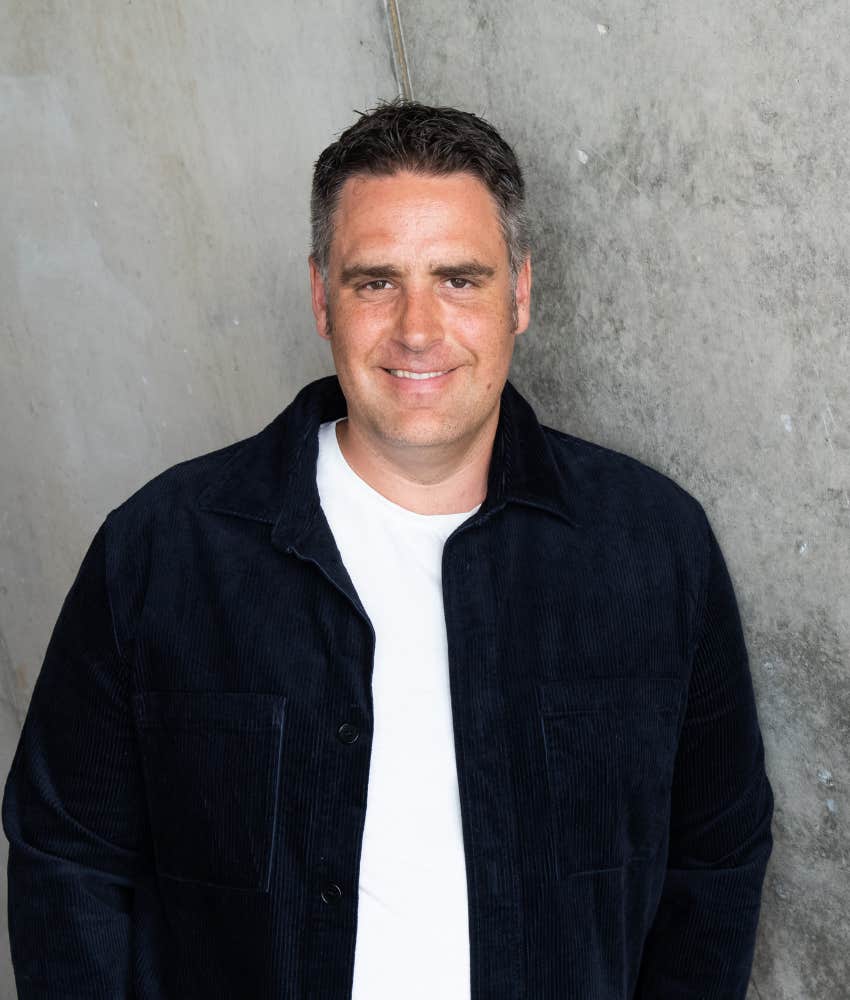People Who Can't Keep Good Relationships Going Usually Have These Same 7 Bad Habits
The solution isn't finding someone new, it's finding a new way of doing things.
 Africa Studio via Shutterstock
Africa Studio via Shutterstock In order to live truly happy lives, we must overcome our past pain and traumas. That doesn't mean pushing them away or trying to forget, but rather to move through them and heal. If we don't we risk developing bad habits that make it hard to keep good relationships going.
Mind-body healthcare icon Alex Howard admitted that's easier said than done, sharing his own journey to self-acceptance and healing on the Getting Open podcast. He also shared a few bad habits that people who struggle with relationships share — and nearly all of them relate back to unprocessed, unhealed pain.
Howard, author of It's Not Your Fault, and creator of the Therapeutic Coaching methodology, documents his therapeutic work with real people on his YouTube series, In Therapy with Alex Howard, and gave host Andrea Miller a sense of what it might look like to heal — and what it looks like to stay stuck.
Here are seven habits of people who can't keep good relationships going, likely because of unhealed pain
1. They don't deal with their past traumas
Howard recalled a period of his life where he was dealing with severe anxiety and panic attacks, while also being involved in unhealthy relationships that wouldn't be able to last past three months. To solve this, he decided to go back to approaching his trauma healing in the same way that he'd approached his physical healing from dealing with his chronic health issue.
"I realized that we all have been shaped and impacted by childhood experiences. But the things that impacted me were firstly, having a father who left soon after I was born," Howard admitted. "Then the pressures of that on my mum, who was working three jobs and under financial pressure."
Howard realized that he'd learned defensive strategies that were causing him to suffer in life. To overcome this obstacle, Howard not only confronted his past traumas but was able to see how they were affecting his life as an adult, especially in terms of his career.
2. They push away uncomfortable feelings
Through his childhood experiences, Howard recalled that he never felt like he had a safe place for his emotions, thoughts, and feelings. To combat this, Howard was constantly trying to detach himself from his feelings, which only prolonged the healing process to move past trauma.
"A big part of that healing was to really lean into those feelings and lean into that pain because it's through that, that we actually find what we're missing," Howard said.
3. They connect achievement with self-esteem
 Alex Howard
Alex Howard
Howard recalled that before embarking on his journey to heal and gain the necessary tools to be able to cater to a healthy relationship, he found it difficult to be intimate with another person. "I needed a process to metabolize what was held in my body. I needed to work to regulate my nervous system in a different way," he said.
He continued, "I needed to unhook my self-esteem for my external achievements and accomplishments. And you know, that was its own journey. But on the other side of that, the anxiety and panic attacks stopped. I went from not being able to have a relationship longer than three months to then meeting my now wife, and we've been together now, I think it's 14, 15 years."
It's a challenging feat but Howard insisted that through letting go of achievement connected to self-esteem, his entire life transformed. He even pointed out that the things we tend to avoid most are typically places where the greatest treasures lie. The truth is relationships are not all sunshine and rainbows. There come complicated moments that don't offer any external validation the same way you might get from success and achievements.
4. They believe success is the most important thing
This is especially true for men, who are drilled with this expectation that achieving a successful career will be the solution to their problems and is the pinnacle of happiness when that's actually not quite the case. This mindset goes hand-in-hand with men being taught that their emotional well-being isn't an important aspect of getting their life together.
"I think what happened to me was that my external success at that time was ahead of my internal ability to hold that," Howard said. He explained that his work in clinical care has allowed him to come across people in their 20s who, on the outside, look to have everything. Because of this, Howard has found himself often reflecting on his own youth and noticing that many of these young people may have things that he didn't have when he was their age, including financial success.
"But then, of course, they would come and tell me all the things in their life that weren't working. And so anyway, it was a deep blessing for me because I came to realize that how things look on the outside actually tells you what's happening on the inside," Howard continued.
5. They focus on polishing the outside
Howard insisted that the more polished someone is on the outside, the more it's apparent that something is missing on the inside. No matter how perfect your outward appearance is, if you haven't healed from the inside-out then you will still run into these same obstacles. Howard reminisced on stories that he used in his book, and about two to three different people included had the same experience of being sent away to boarding school at a young age.
"The way it typically worked in those days in this country where there weren't any mobile phones. You weren't allowed to phone home, and you weren't allowed to write home for the first few weeks because they needed to get a severance of the parent-child bond," Howard said. However, the boarding school wouldn't allow the students to include certain feelings in their letter because it would be "distressing" for their parents to read.
Because this is happening, Howard noticed that these kids were forced to rationalize and forget their own feelings, but of course, all of those feelings and trauma are still trapped in their bodies.
"We need to be able to hold the wounded younger child that needs to be allowed to have those feelings."
6. They blame others for their problems
Howard wrote in his, 'It's Not Your Fault,' that the problems are parents had when they raised us that ended up causing trauma that still affects us in our adult age is not our parent's fault. A controversial opinion, for sure, but Howard explained that two things can be true. One, for the younger wounded part of us, it is our parents' fault.
"We didn't get what we needed. We all have core emotional needs, like the need to feel safe, the need to feel love for who we are as we are, and when those needs are not met. We don't develop emotionally and psychologically to our optimum. So part of one's healing work is to really let oneself own the hurt, the rage, the hatred, the anger, [and] the parts of them and the places that didn't get what they need to be validated."
The second truth is that you end up living in that place and are effectively a victim who has no power over becoming the person that you eventually want to become. That's why it's important to realize that our parents loved us and did the best they could with the tools they were given and the resources they had, both physically and emotionally. He likened it to the relationship with his mom and how throughout his childhood, there were certain things that he wasn't able to get from her.
But he acknowledged that she still loved him and tried her best to be there for him in the ways that mattered.
7. They can't hold two truths at the same time
In the same way that Howard spoke about his mom and the missing components that she was unable to give him while he was growing up, that same dynamic can exist in our adult relationships. Someone can love us wholeheartedly and be a good person but still not be able to give us what we need. However, contrary to being a child, as an adult, it's our duty to recognize that and be able to move on instead of staying and suffering.
"We need to be able to hold the wounded younger child that needs to be allowed to have those feelings. But we need to not let that become our identity and not let that become part of our story. It is not your fault, but it is your responsibility."
Nia Tipton is a staff writer with a bachelor’s degree in creative writing and journalism who covers news and lifestyle topics that focus on psychology, relationships, and the human experience.

